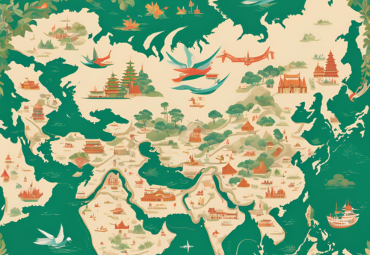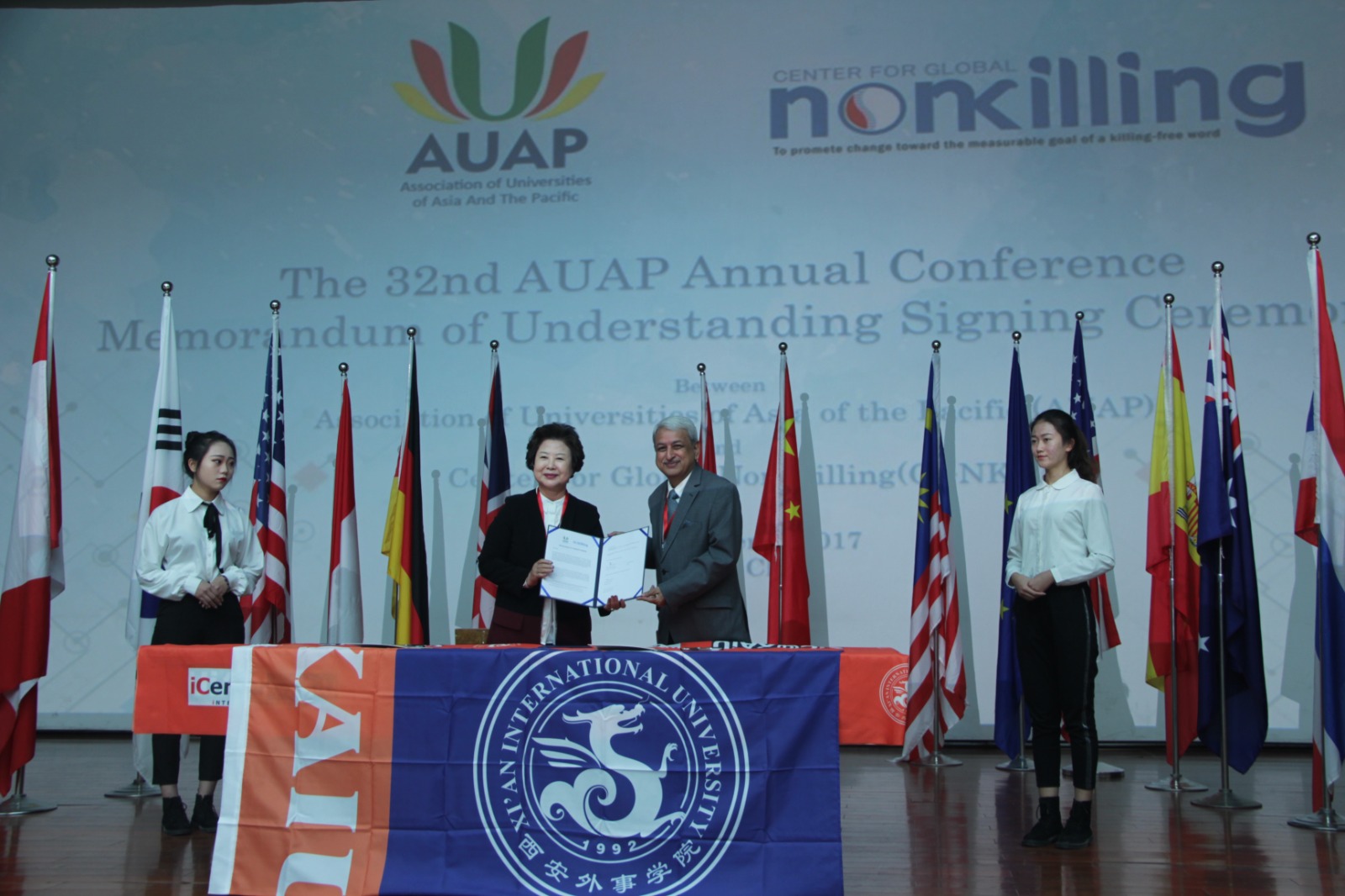Affiliates
Affiliates
-
The Asian World Nonkilling Consortium is a collaboration between the Asian World Center at Creighton University (Omaha, NE, USA) and the Center for Global Nonkilling to advance research, educational and policy programs focused on nonkilling. The Consortium has organized lectures and co-published several books with CGNK, including Nonkilling Media, Nonkilling Security and the State and the Global Nonkilling Working Papers series.
-
The Centre Caraïbéen pour la Non-Violence Globale et le Développement Durable is a Haitian nonprofit fostering nonviolence, nonkilling and sustainable development through research, training and action orientated projects since 2004. Through a series of initiatives, it has emphasized the positive aspects in Hati’s history and culture, building creative nonkilling alternatives. CCNGD is responsible for the French and Haitian Creole editions of Nonkilling Global Political Science. Website. Center for Global Nonviolence – Nigeria is.
-
Mleci / Glenn Paige Nonkilling School is an educational initiative focused on the needs of the local children from Kazimia-Katondje, Great Lakes region of the DR Congo. The school and kindergarten has over 200 students and, as part of its innovative program, teaches nonkilling through an adapted condensation of CGNK’s materials into Kiswahili. The School is a project of the nonprofit organization Mleci.
-
Nonkilling Balkans Forum is an open process leading to the established of an autonomous nonkilling organization in the Balkans region (Albania, Bosnia-Herzegovina, Bulgaria, Croatia, Greece, Macedonia, Montenegro, Slovenia, Serbia and Kosovo) and its communities abroad. As an initial step, a translation of Nonkilling Global Political Science into Central South Slavic has been produced and published in April 2012 by Bosnian publishing house “Bosanska Riječ”. Website.
-
The Philippine Institute for Global Nonkilling is a center for nonkilling research and training established at Kalayaan College, Quezon City, Philippines. The Institute is part of the Movement for a Nonkilling Philippines and provides regular reports on violence and nonkilling interventions through monitoring and mapping projects. The Institute is center of the Movement for a Nonkilling Philippines which seeks legislation to make a “Peaceful and Nonkilling Philippines” a major national goal with provisions for nationwide measurement of progress and governmental action at all levels. Kalayaan College was also pioneer launching the book Towards a Nonkilling Filipino Society in 2004 and a Filipino translation of Nonkilling Global Political Science in 2007.Website.
-
The Zentrum zur Förderung des Nichttötens – Nonkilling Deutschland is a German nonprofit working closely with the Center for Global Nonkilling to foster nonkilling knowledge, research and advocacy among German-speaking countries. Besides producing a German translation of Nonkilling Global Political Science it commits important efforts to introduce nonkilling in the arts and to bring to public consciousness the nonkilling legacy of Petra Kelly (1947-1992). Website.
-
The Brazilian Institute for Nonkilling (INAM) is a Brazilian-based nonprofit established in 2009 to promote nonkilling through education, policy and research initiatives. INAM has been partnering with CGNK on the development of a Global Nonkilling Observatory at the Itajaí Valley University and a Portuguese edition of Nonkilling Global Political Science published by the Federal University of Pernambuco Press. Website
-
The Gandhian Nonkilling Movement in India . Website

Affiliates News
- A Nonkilling Reflection on the Haitian Situation
- Creating an affirmative nonkilling world
- Jagran Lakecity University at Bhopal, Launches Centre for Nonkilling and Peace/li>
- Launch of Nonkilling India by Gandhi Darshan at New Delhi
- A Nonviolent and Nonkilling India: The Gandhian Dream of Ramrajya
- Center for Nonkilling and Development in Bangladesh initiates lecture series
- National Campaign Launch “Give Nonviolence A Chance and make Nonkilling A Mission”
- Centre for Nonkilling and Development established in Bangladesh
- Tribute to Glenn Paige at the University of Chittagong
- Give Nonviolence a Chance: The Journey of Neelakanta Radhakrishnan
Memorandum of UNDERSTANDING
Between
The CENTER FOR GLOBAL NONKILLING, an organization with consultative status with the United Nations Economic & Social Council (ECOSOC), is a 501(c)3 nonprofit organization incorporated in the State of Hawaii, U.S. and is hereinafter referred to as CGNK. The vision of the Center for Global Nonkilling is to promote change toward the measurable goal of a killing-free world by means open to infinite human creativity. The goal can be reached by globally advancing nonkilling knowledge and skills, incorporating them into education and training, and applying them in individual and social decisions for the well-being of all.
the ASSOCIATION OF UNIVERSITIES OF ASIA AND THE PACIFIC, Association of Universities of Asia and the Pacific (AUAP) is an association of university chief executives from higher education institutions in Asia Pacific and around the world. AUAP was founded and established by representatives of universities in the Asia and Pacific region assembled in conference at Suranaree University of Technology, Nakhorn Ratchasima, Thailand, on 28 July 1995 provided the means whereby the universities at the Asia and Pacific region can get together and is known as AUAP. Document properties 2 WHEREAS CGNK desires to advance its mission to promote change toward the measurable goal of a killing-free world by means open to human creativity in reverence for life. The primary purpose of AUAP is to be the main platform for interaction and collaboration among members and the voice of universities in Asia and the Pacific:
And
the ASSOCIATION OF UNIVERSITIES OF ASIA AND THE PACIFIC, Association of Universities of Asia and the Pacific (AUAP) is an association of university chief executives from higher education institutions in Asia Pacific and around the world. AUAP was founded and established by representatives of universities in the Asia and Pacific region assembled in conference at Suranaree University of Technology, Nakhorn Ratchasima, Thailand, on 28 July 1995 provided the means whereby the universities at the Asia and Pacific region can get together and is known as AUAP.
Whereas
CGNK desires to advance its mission to promote change toward the measurable goal of a killing-free world by means open to human creativity in reverence for life. The primary purpose of AUAP is to be the main platform for interaction and collaboration among members and the voice of universities in Asia and the Pacific:
-
To promote a culture of quality and innovation in higher education, research and service to the community
-
To preserve and enhance the values and cultural diversity of Asia Pacific towards better understanding and cooperation for socioeconomic development and (universal) peace
-
To engage with stakeholders of the higher education and other organizations to further the objectives of AUAP.
-
Both parties wish to develop and formalize an affiliation that will facilitate cooperation to promote nonkilling change building upon their respective strengths. THEREFORE the parties agree with each other as follows:
1. Purpose
The purpose of this Memorandum of Understanding is to formalize, expand and enhance the working relationship between the parties, and to set forth the principles, objectives and process for developing nonkilling educational, research, monitoring and policy programs that capitalize on the respective strenghts of the parties.
2. Benefits
It is acknowledged that an affiliation betwween the parties will benefit both parties, in that: CGNK will benefit from increased interaction with AUAP and its members, including first hand knowledge on the reality of killing and the implementation of nonkilling initiatives in its sphere of activity and influence; AUAP will benefit from direct access to resources and networks developed by CGNK and participation in global organizations such as the United Nations Economic and Social Council or the World Health Organization's Violence Prevention Alliance.
4. Recognition
CGNK and AUAP have the following understanding: CGNK recognizes that AUAP is the main organization representing its global nonkilling efforts in Asia and the Pacific. CGNK will work with AUAP to further their respective objectives, in relation to the overall goal of advancing nonkilling societies, from local to global. The development and oversight of all joint programs will be facilitated through the Focal Persons of each party.
5. implementation
Possible areas of cooperation may include, but are not limited to: Cooperative development of materials, including joint publications, translations, videos, etc. Development of cooperative research projects and colloquia, incorporating members of AUAP and its sphere of activity in CGNK's Nonkilling Research Committees; Activation of joint monitoring programs, including the creation of an Asia and Pacific Nonkilling Observatory and Bluebooks and locally relevant Guides of Best Practices; Joint recognition of neighbourhoods, municipalities, cities, regions or countries through the Nonkilling Communities Flag Program in cooperation with their public authorities; Joint preparation of nonkilling policy recommendations and legislation proposals; Joint organization of country/regional Nonkilling Leadership Academies; Development of joint partnerships with educational institutions, from primary to university education, for the introduction of nonkilling through specific School Guides and Curricula; Elevation of proposals to the United Nations Economic and Social Council and its Functional Commissions, the World Health Organization's Violence Prevention Alliance and the World Summits of Nobel Peace Laureates, through CGNK's representatives or participating directly through CGNK's delegations. AUAP will ellaborate an Annual Implementation Report to be sent to CGNK by December 31 of the year in question, with an overview of all actions and programs related to the Purpose stated above in the Memorandum of Understanding. CGNK will include the main aspects of the Annual Implementation Report provided by the AUAP in its own Annual Report, that will be submitted by April 1 of the subsequent year. Both parties will designate one Focal Person from each organization for the development and oversight of all matters related to this Memorandum of Understanding.
6. Not legllay bind
This Memorandum of Understanding is not meant to be a legally binding agreement, and will not be interpreted as waiving, creating, recognizing, denying, or amending any legally enforceable rights or interests of the parties. For greater certainty, it does not affect the legal rights or obligations that either party may possess or any existing agreements between the parties.
7. Relationships Not Exclusive
Nothing in this Memorandum of Understanding will be construed as preventing AUAP from entering into other memoranda or relationships with other organizations or institutions that promote its interests at the local or international level. Nothing in this Memorandum of Understanding will be construed as preventing CGNK from entering into other memoranda or relationships with other organizations or institutions that promote its interests in the area where AUAP operates or elsewhere.
8. Termination
Either party may terminate this Memorandum of Understanding by providing 60 days written notice to the other party. Notwithstanding such notice, this Memorandum of Understanding will remain in effect for any project created pursuant to this Memorandum of Understanding that is in progress on the date the notice is given until such time as that project is completed.
9. General Provision
Nothing contained in the Memorandum of Understanding will be construed or deemed to authorize one party to act as agent for the other, and neither party will contract, agree or make any commitment, representation or warranty which binds the other party, or otherwise do any act in the name of, or purport to act on behalf of, the other party. Any modification to this Memorandum of Understanding must be made in writing by the authorized signatories of the parties.
10. Commencement
Nothwithstanding the date of execution of this Memorandum of Understanding, its date of commencement shall be November 8, 2017. In witness whereof the Parties have executed this Memorandum of Understanding on November 8, 2017.

